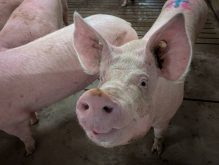Chicago’s iconic pork belly market has closed after 50 years of being the subject of jokes for movies and TV shows and satisfying Americans’ hunger for bacon-lettuce-tomato sandwiches.
The Chicago Mercantile Exchange shut down the frozen pork belly futures market at the end of business on Friday, July 15.
The closing had been expected. Trading in pork belly futures had dropped to zero in recent years after the meat industry became integrated and used fresh pork bellies instead of frozen ones to make bacon.
Read Also

THROWBACK: Pro tips for a calving crisis
This article from 2024 walked farmers through common calving issues, and when the dystocia is serious enough that you need…
The contract started trading in 1961 and was the oldest existing CME livestock futures contract.
Pork bellies, as the name indicates, are cuts of pork that come from the underside of the hog and are made into bacon.
Because pork production peaks in the autumn, the frozen pork belly contract was created as a way to give pork companies a means to cover the cost of storing, or freezing, pork bellies until the following summer when they were thawed and processed into bacon, said longtime Chicago trader Bob Short.
Pork bellies had their heyday in the late 1960s and 1970s, when they were the CME’s most popular agriculture contract.














